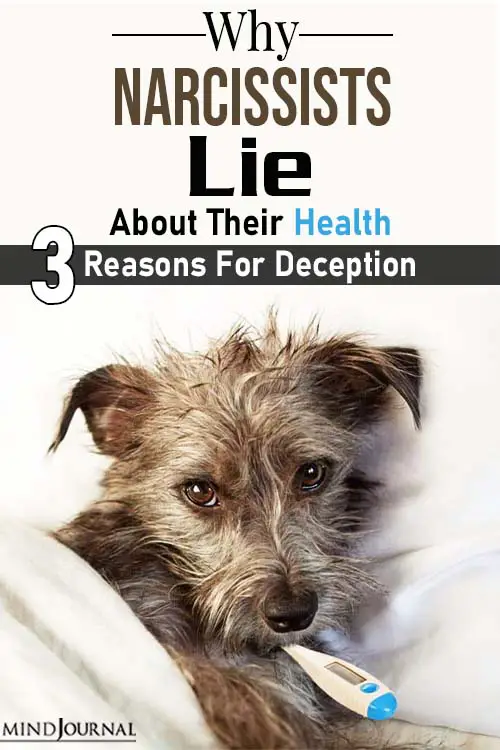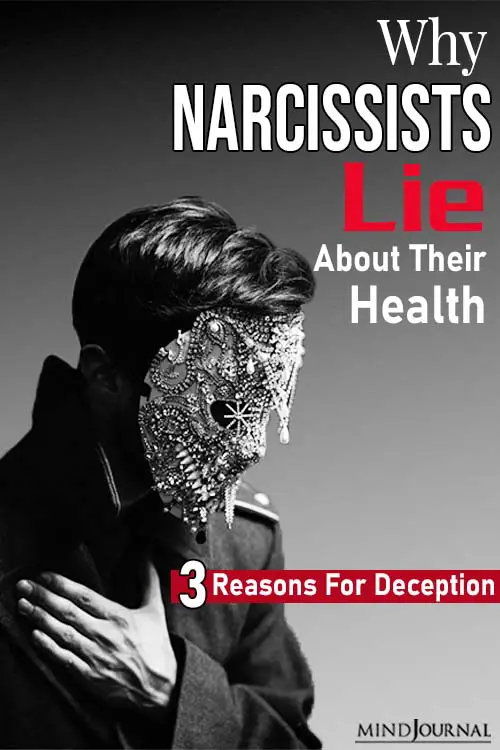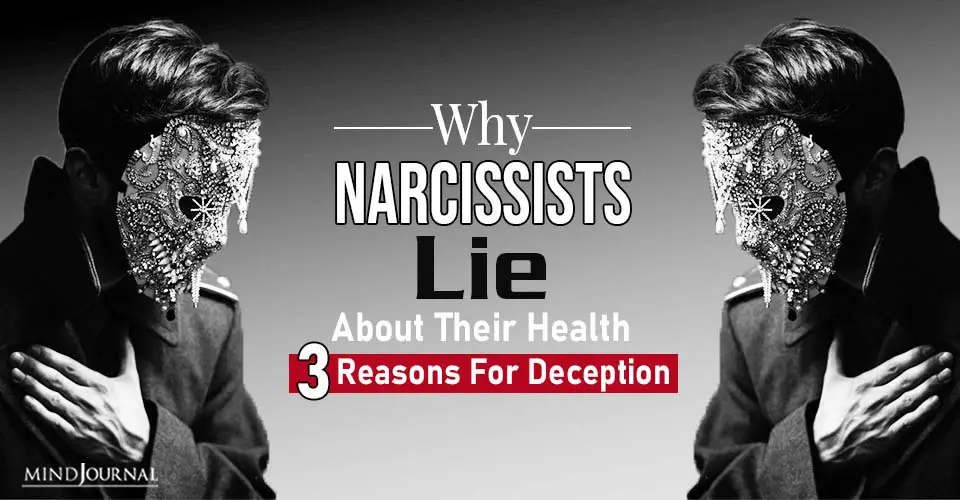Key Points: Individuals who are high in narcissism may be more likely than others to fake being seriously ill or to fabricate a “health scare.” While the lie’s motivation isn’t always clear, evidence suggests that it may be a way to exert control over others, gain desired attention, or boost the narcissist’s reputation.
Narcissists are known for their compulsive desire for attention and control. They often feel entitled to obtaining and maintaining power and the ability to influence others in all of their relationships, whether it be personal or private.
Power is a fickle concept as it doesn’t need to be intentionally or consciously surrendered; disturbingly, a narcissist can take control of others without explicit permission and simply through manipulation. The vast majority of those high in narcissism prefer exploitative relationships (Set, 2020). Exploitative relationships exist to serve the narcissist, fulfill their desires, and simply keep them (and them alone) happy. Some narcissists go to extreme lengths to establish or maintain relationships that are self-serving—even if that means lying about their health or survival.
Deception is the name of the game for many narcissists. It is defined as the ability to lie successfully and effectively (Wright, Berry, Catmur, & Bird, 2015). Narcissists are often experts at deception. Not only can they create a scenario and narrative, but they can play the part perfectly from beginning to end.
Related: The Ninja Narcissist: 7 Secret Signs Of A Covert Introvert Narcissist
How Narcissistic Deception Leads To “Health Scares”
Despite the immorality, health scares can fall into this category of deception. There are several categories of medical manipulation that are mental disorders—including factitious disorder (Bratskier, 2019). Factitious disorder is an umbrella term for more well-known situations such as Munchausen syndrome or Munchausen by proxy.
Factitious disorders are generally born of the need for attention and sympathy. These people talk about their illness openly, go to appointments, and even start fundraisers for themselves. Unlike hypochondriacs, individuals with factitious disorders know they are not sick: they are just good liars who crave the spotlight.
Narcissists master the art of malingering. Fabricating an affliction or exaggerating a minor illness is used to seek attention, gain sympathy, or simply avoid responsibility (Bratskeir, 2019). While almost anyone has feigned a fever or stomachache to leave work early, most people would consider it morally repugnant to cash in on a serious illness such as cancer.
“As a survivor of kidney cancer, and someone who is being closely watched because it has metastasized, I am personally offended by people who lie about being sick,” says Linda, 62.
Even though not all narcissists lie about their health, they are more likely to lie in general and less likely to feel guilty about deceiving others (O’Reilly & Doerr, 2020). Narcissistic behavior predominantly occurs in social settings to garner the most attention, influence, and encouragement (Fourie, 2020). Thus, fabricating or exaggerating medical problems is fertile ground for narcissistic growth.
In general, narcissists have very low ethical standards and transgress social norms. They are far more willing to cheat or steal and have relationships rife with distrust and infidelity.

Narcissists can lie about their health
They may feel such a personal superiority that they have no qualms exploiting others to get ahead. This overwhelming entitlement also precludes anger, hostility, and violence when the narcissist is ignored or does not get what they want (O’Reilly & Doerr, 2020). Lying about a medical issue or exaggerating an actual situation can occur for several reasons. In some instances, there is just an addiction to lying and the rush of adrenaline that comes with “getting away with it.”
Three common narcissistic reasons are to exert control over people, create a narrative or reputation, or simply gain attention and belonging.
Here Are The 3 Narcissistic Reasons
1. Exerting control.
After a painful breakup, Genevieve missed a call from her ex-girlfriend. A text message from the ex followed the missed call, stating that she had been diagnosed with breast cancer. “She said he had been diagnosed right before our breakup, but that she didn’t want to burden me with it,” recalls Genevieve. “I texted her back immediately, within two minutes of her missed call and her text. She didn’t answer because she was having people over.”
But it turned out that the cancer claim was simply an attempt to regain control over Genevieve’s emotions and put the ex back into center stage. The ex “kept texting… not about her illness, but to see if I still wanted to be her beneficiary. I showed concern for her illness but told her it’s not up to me who the beneficiary is. She let me know when she changed the beneficiary and said she hoped I was happy and got what I wanted.”
Because Genevieve didn’t respond to the breast cancer claim and go back to the toxic relationship, the ex turned the tables and guilted Genevieve. “I was, of course, sworn to secrecy about the breast cancer, but that’s because it didn’t exist. At the same time, she was posting photos of her new girlfriend and tweeting about flying between states to commute. People who are sick aren’t partying and taking airplanes to work.”
Related: Why Your Abusive Narcissist Partner Claims To Be The Victim
2. Boosting a reputation.
Having a serious illness that is known for bringing physical and mental anguish is almost a badge of honor for certain people. Being labeled as “strong,” “brave,” or “a fighter” are positive attributions for anyone, and more so for those going through a supposed “battle.” Some narcissists may use this to turn their reputations around from being called difficult or rude into struggling or persevering. By relying on other’s empathy and sympathy, narcissists can manipulate goodness into a vehicle for self-help.
Claims of beating cancer or fighting a devastating illness can cover up even the darkest of intentions and cause people to put on their rose-colored glasses and look away from past wrongdoings. Narcissists are particularly talented at turning the tables and rewriting narratives to make themselves look like the hero and the martyr.
Andy, for example, states that his ex-partner used her chronic illness during their custody battle. “Her illness was well maintained, and her condition stable and medicated—as it had been for years during our relationship—but the lawyer flouted it to the judge so that she looked like a poor, selfless, suffering mother desperate for her children. My ex would sit in front of the judge looking pained and downtrodden but was laughing and smiling outside the courtroom.”
3. Winning attention.
Getting and maintaining attention is, in itself, a near-compulsion for many narcissists. People tend to rally around cancer patients and those with other debilitating illnesses in the forms of fundraisers, support groups, special events, and benefits. Don’t be surprised to see lots of selfies and hashtags about the narcissist’s illness or “journey”!
Narcissists struggle mightily to foster true emotional relationships with other people and typically only create tenuous ties for personal gain. To them, attention is mandatory and a necessary part of relationships. Their overwhelming sense of entitlement allows them to think the attention and support are warranted and deserved, regardless of the honesty of the situation. This is the same reason why narcissists are so prone to cheating on their partners; they feel deserving of the extra attention and shouldn’t have to sacrifice their own wants.
When it comes to a cancer diagnosis or other physical impairment, people tend to open their hearts—and their wallets—very easily. Those with narcissistic tendencies are already highly skilled at manipulating others and playing the “cancer card” (or faking another kind of health scare) may be a quicker means to an end.
References:
Bratskier, K. (2019). The psychology behind people who fake cancer. Huffpost. O'Reilley, C. A. & Boerr, B. (2020). Conceit and deceit: Lying, cheating, and stealing among grandiose narcissists. Personality and Individual Differences 154. https://doi.org/10.1016/j.paid.2019.109627 Set, Z. (2020). Social malicious personalities: The dark triad. Current Approaches in Psychiatry. 318-329. Wright, G. R. T., Berry, C. J., Catmur, C. & Bird, G. (2015). Good liars are neither 'dark' nor self-deceptive. PLOS One, 10(6).
Written By Kristy Lee Hochenberger Originally Published In Psychology Today










Leave a Reply
You must be logged in to post a comment.